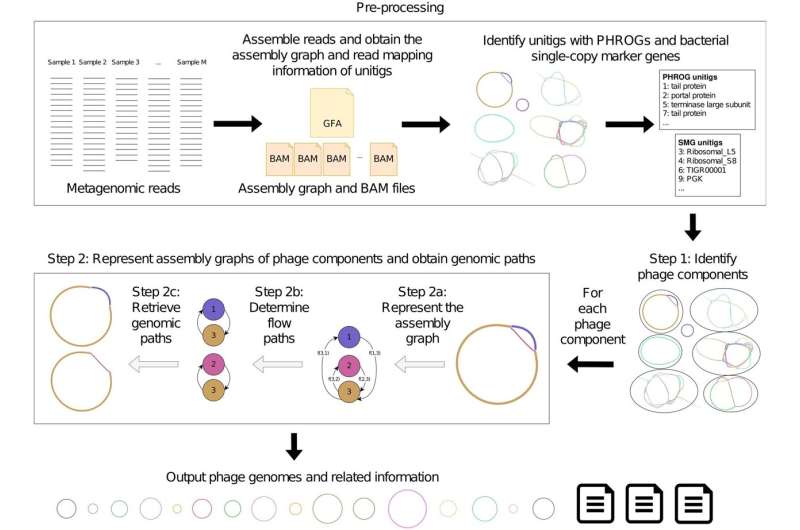This article has been reviewed according to Science X's editorial process and policies. Editors have highlighted the following attributes while ensuring the content's credibility:
fact-checked
peer-reviewed publication
trusted source
proofread
New software paves the way for finding bacteriophages to control bacteria

A new bioinformatics software program at Flinders University is paving the way for a rapid expansion of research into bacteriophages, the viruses or phages that play key roles in controlling bacteria.
Experts at the Flinders University College of Science and Engineering have released a computational tool for researchers around the world to find 'bacteriophages' or phages through more accurate genome sequencing.
The new "Phables' computational tool can identify and characterize 49% more complete phage genomes compared to existing viral identification tools, according to a new article in Bioinformatics.
Research into isolating and harnessing bacteriophages paves the way for progress in the emerging field of "phage therapy," a more natural way to target specific bacteria that post a constant risk to immune-compromised, young and elderly patients, as well as 'super' bacteria which has become resistant to regular antibiotics.
Antimicrobial resistance (AMR) is a major global risk when broad-spectrum antibiotics no longer work on 'superbugs' created when common bacteria go through multiple genetic changes. The WHO has warned that AMR is one of the top public health threats facing humanity in the 21st century and was associated with the death of close to 5 million people in 2019.
"Understanding phages is essential because they can influence everything from the health of ecosystems to the treatment of bacterial infections in humans," says Flinders University research associate Dr. Vijini Mallawaarachchi from the Flinders Accelerator for Microbiome Exploration (FAME) Lab.
"Traditional methods of studying phages from environmental sequencing data have been limited, often failing to fully capture the complete genetic information of phages. This incomplete picture has been a barrier to fully understanding their roles and impacts."
FAME Lab director Professor Robert Edwards, a co-author of the latest article, says the Phables software can computationally reconstruct the genetic content of phages from environmental sequencing data.
"This marks a major advancement in phage bioinformatics, allowing us to computationally reconstruct complete phage genomes," says Professor Edwards from the College of Science and Engineering.
"It will facilitate the discovery of novel phages and enable their laboratory isolation, which will lead to advancements in medical treatments, environmental management, and a deeper understanding of microbial life."
"This revolutionary tool not only enhances our understanding of the microbial world but also paves the way for innovative solutions to some of the most pressing health and environmental challenges of our time."
Phables uses a new, more effective approach to piece together the genetic information of phages with tests on various datasets showing the new tool can identify more complete contiguous genomes of phages than existing state-of-the-art software tools.
Phables has almost 9,000 downloads across different software repositories. The tool was launched at the Australian Society for Microbiology Annual National Meeting 2023 and the Australian Bioinformatics and Computational Biology Society Conference 2023.
Next year, the Flinders University research team aims to use the Phables tool to discover novel phages and potentially use these isolated phages in therapies, including new treatment options for individuals with conditions such as cystic fibrosis and inflammatory bowel disease.
More information: Vijini Mallawaarachchi et al, Phables: from fragmented assemblies to high-quality bacteriophage genomes, Bioinformatics (2023). DOI: 10.1093/bioinformatics/btad586
Journal information: Bioinformatics
Provided by Flinders University




















